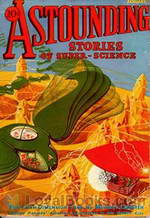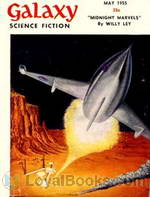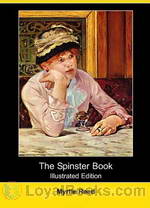|
Books Should Be Free Loyal Books Free Public Domain Audiobooks & eBook Downloads |
|
|
Books Should Be Free Loyal Books Free Public Domain Audiobooks & eBook Downloads |
|
Science |
|---|
|
Book type:
Sort by:
View by:
|
By: Murray Leinster (1896-1975) | |
|---|---|
 The Fifth-Dimension Tube
The Fifth-Dimension Tube
| |
 Space Platform
Space Platform
SPACE PLATFORM tells the exciting story of a young man helping to build this first station. With scientific accuracy and imagination Murray Leinster, one of the world's top science-fiction writers, describes the building and launching of the platform. Here is a fast-paced story of sabotage and murder directed against a project more secret and valuable than the atom bomb! | |
 Long Ago, Far Away
Long Ago, Far Away
| |
 Invasion
Invasion
| |
 Attention Saint Patrick
Attention Saint Patrick
| |
 Morale A Story of the War of 1941-43
Morale A Story of the War of 1941-43
| |
 Scrimshaw
Scrimshaw
| |
 The Invaders
The Invaders
| |
 The Leader
The Leader
| |
 Sam, This is You
Sam, This is You
| |
By: Myrtle Reed (1874-1911) | |
|---|---|
 The Spinster Book
The Spinster Book
A cross between guidebook and social commentary, The Spinster Book gives clever and humorous insights on topics such as courting, handling men and women, love letters, marriage and spinsterhood. | |
By: Nathan Schachner (1895-1955) | |
|---|---|
 Pirates of the Gorm
Pirates of the Gorm
| |
 Slaves of Mercury
Slaves of Mercury
| |
By: Nathaniel Gordon | |
|---|---|
 The Golden Judge
The Golden Judge
| |
By: National Advisory Commission on Civil Disorders | |
|---|---|
 Report of the National Advisory Commission on Civil Disorders (Kerner Commission Report)
Report of the National Advisory Commission on Civil Disorders (Kerner Commission Report)
The summer of 1967 again brought racial disorders to American cities, and with them shock, fear and bewilderment to the nation. The worst came during a two-week period in July, first in Newark and then in Detroit. Each set off a chain reaction in neighboring communities. On July 28, 1967, the President of the United States [Lyndon B. Johnson] established this Commission and directed us to answer three basic questions: What happened? Why did it happen? What can be done to prevent it from happening again? This is our basic conclusion: Our nation is moving toward two societies, one black, one white--separate and unequal... | |
By: National Atomic Museum (U.S.) | |
|---|---|
 Trinity site
Trinity site
| |
By: National Industrial Conference Board | |
|---|---|
 The Cost of Living Among Wage-Earners Fall River, Massachusetts, October, 1919, Research Report Number 22, November, 1919
The Cost of Living Among Wage-Earners Fall River, Massachusetts, October, 1919, Research Report Number 22, November, 1919
| |
By: National Security Council (U.S.) | |
|---|---|
 National Strategy for Combating Terrorism September 2006
National Strategy for Combating Terrorism September 2006
| |
By: Neil Goble | |
|---|---|
 Master of None
Master of None
| |
By: Neil Ronald Jones (1909-1988) | |
|---|---|
 The Jameson Satellite
The Jameson Satellite
| |
By: Nellie Lathrop Helm | |
|---|---|
 Uncle Robert's Geography (Uncle Robert's Visit, V.3)
Uncle Robert's Geography (Uncle Robert's Visit, V.3)
| |
By: Nellie McClung (1873-1951) | |
|---|---|
 In Times Like These
In Times Like These
" Believing that the woman's claim to a common humanity is not an unreasonable one, and that the successful issue of such claim rests primarily upon the sense of fair play which people have or have not according to how they were born, and Therefore to men and women everywhere who love a fair deal, and are willing to give it to everyone, even women, this book is respectfully dedicated by the author." | |
By: Nelson Slade Bond (1908-2006) | |
|---|---|
 Lighter Than You Think
Lighter Than You Think
| |
By: Neltje Blanchan (1865-1918) | |
|---|---|
 Wild Flowers An Aid to Knowledge of Our Wild Flowers
Wild Flowers An Aid to Knowledge of Our Wild Flowers
| |
 Wild Flowers Worth Knowing
Wild Flowers Worth Knowing
| |
 Bird Neighbors
Bird Neighbors
| |
By: Nesta Helen Webster (1876-1960) | |
|---|---|
 Secret Societies And Subversive Movements
Secret Societies And Subversive Movements
| |
By: New York Hospital. Society [Editor] | |
|---|---|
 A Psychiatric Milestone Bloomingdale Hospital Centenary, 1821-1921
A Psychiatric Milestone Bloomingdale Hospital Centenary, 1821-1921
| |
By: New Zealand Committee | |
|---|---|
 Report of the Committee of Inquiry into the Various Aspects of the Problem of Abortion in New Zealand
Report of the Committee of Inquiry into the Various Aspects of the Problem of Abortion in New Zealand
| |
By: New Zealand. Committee of Inquiry into Mental Defectives and Sexual Offenders | |
|---|---|
 Mental Defectives and Sexual Offenders Report of the Committee of Inquiry Appointed by the Hon. Sir Maui Pomare, K.B.E., C.M.G., Minister of Health
Mental Defectives and Sexual Offenders Report of the Committee of Inquiry Appointed by the Hon. Sir Maui Pomare, K.B.E., C.M.G., Minister of Health
| |
By: New Zealand. Committee of the Board of Health | |
|---|---|
 Venereal Diseases in New Zealand (1922) Report of the Special Committee of the Board of Health appointed by the Hon. Minister of Health
Venereal Diseases in New Zealand (1922) Report of the Special Committee of the Board of Health appointed by the Hon. Minister of Health
| |
By: New Zealand. Special Committee on Moral Delinquency in Children and Adolescents | |
|---|---|
 Report of the Special Committee on Moral Delinquency in Children and Adolescents
Report of the Special Committee on Moral Delinquency in Children and Adolescents
| |